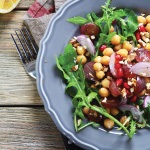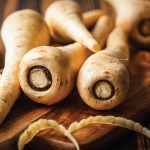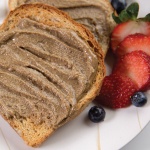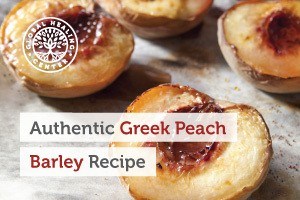
Substituting your bland oatmeal for this indulgent peach porridge is a flavorful way to kick off your day. Mediterranean food is tempting and healthy, and this authentic Greek barley recipe from the Greek Vegan is no exception. Roasted peaches, maple syrup, orange juice, cinnamon, cardamom, and barley come together beautifully in this sweet treat that’s perfect for breakfast, dessert, or a side dish! I recommend portioning servings into containers for a great post-workout snack to cool you down or combat the summer heat.
This recipe will produce three servings, each under 220 calories but high in fiber and loaded with manganese, selenium, thiamin and vitamin B6. Following the Mediterranean-style diet can reduce your risk of health concerns later in life[1] because it emphasizes eating healthy plant foods, fiber, whole grains like barley, legumes, nuts, and olives.[2]
Authentic Greek Peach Barley
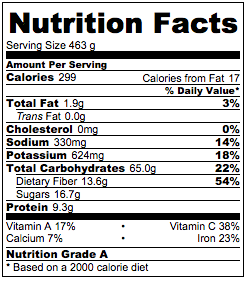
- Prep time: 15 minutes
- Cook time: 45 minutes
- Total time: 2 hours
- Serves: 3
Equipment
- Spoon
- Baking sheet
- Basting brush
- Knife
- Pot for boiling
- Small pan
- Large bowl
Ingredients
- 1 cup barley
- 3 cups water
- 1/2 tsp Himalayan salt
- 3 tsps maple syrup (or agave)
- 3 tbsps of orange juice
- 1/2 tsp cinnamon
- 1/2 tsp ground cardamom
- 3-4 roasted peaches (2 cups chopped)
- 1/3 cup fresh chopped mint
- Optional toppings: sliced fresh peaches, toasted pecans, and golden raisins
Instructions
- Preheat oven to 400 degrees.
- Mix equal parts of both maple syrup (or agave syrup) with orange juice. Set aside.
- Rinse, halve, and remove seeds from peaches with a spoon or your fingers.
- On a baking sheet, arrange peaches cut side up, fuzzy side down.
- Lightly brush the cut side with the syrup and orange juice mixture.
- Bake uncovered until tender, 20-30 minutes.
- Once cool, peel off peach skin and discard.
- Dice peeled peaches into ½" pieces and set aside.
- With the peaches in the oven, bring barley, salt, and water to a rolling boil. Once boiling, immediately reduce heat to a very low setting and cover.
- Cook on very low for 45 minutes, or until barley is tender.
- Set a small pan to very low heat and stir in 3 tsp syrup, 3 tbsp orange juice, and spices together, stirring gently and constantly. Once you have a thin liquid, set aside. For a sweeter syrup mixture, stir in up to a tablespoon of raw sugar while the mixture is warming on the stove.
- Once barley is tender, remove from heat and immediately transfer to a large heat-resistant bowl.
- Pour in syrup mixture into still hot barley and stir until well coated. Let cool until warm.
- Mix in diced peaches and mint. Gently stir together until well combined.
- Refrigerate for 1-2 hours.
- Garnish with sliced peaches, toasted pecans, or golden raisins and enjoy!
Benefits of Barley
Barley is a healthy, versatile grain and a great pantry staple. Incorporating barley recipes into your weekly meal plan is a great strategy for encouraging normal cholesterol and blood pressure.[3] Barley is also a great source of fiber – 31.8 grams of fiber in a single cup![4, 5, 6]
References (6)
- Godman, Heidi. “Adopt a Mediterranean diet now for better health later - Harvard health Blog.” Healthy Eating. Harvard Health Blog, 6 Nov. 2013. Web. 29 July 2016.
- Chen, Michael A, et al. Mediterranean diet: MedlinePlus medical encyclopedia. 8 Dec. 2014. Web. 29 July 2016.
- Core, Jim. “Study Investigates Health Benefits of Barley.” USDA: Agricultural Research Service. 29 May 2003. Web. 29 July 2016.
- Li, J, et al. “Effects of Barley Intake on Glucose Tolerance, Lipid Metabolism, and Bowel Function in Women.” Nutrition (Burbank, Los Angeles County, Calif.). 19. (2003): 926–9. Web. 29 July 2016.
- “National Nutrient Database for Standard Reference Release 28.” USDA.gov. n.d. Reference Release. 29 July 2016.
- Brown, Lisa, et al. “Cholesterol-Lowering Effects of Dietary Fiber: A Meta-Analysis.” The American Journal of Clinical Nutrition 69.1 (1999): 30–42. Web. 29 July 2016.
†Results may vary. Information and statements made are for education purposes and are not intended to replace the advice of your doctor. If you have a severe medical condition or health concern, see your physician.


